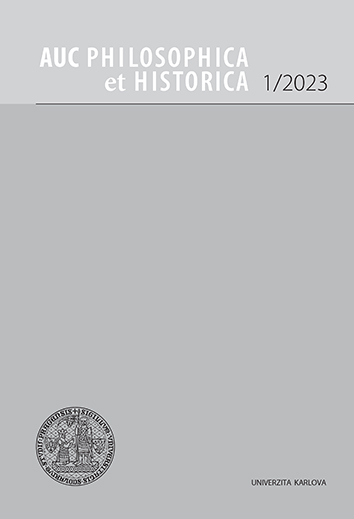AUC Philosophica et Historica je víceoborový akademický časopis zaměřený na humanitní a společenskovědné obory (filozofie, psychologie, pedagogika, sociologie, obecné, české a hospodářské dějiny, pomocné vědy historické a archivnictví, etnologie).
Časopis je indexován v databázích CEEOL, DOAJ a EBSCO.
AUC PHILOSOPHICA ET HISTORICA, Vol 2018 No 1 (2018), 55–78
Whitehead versus Dewey: O filosofii, rytmu a estetické zkušenosti
[Whitehead and Dewey on Philosophy, Rhythm and Aesthetic Experience]
Martin Kaplický
DOI: https://doi.org/10.14712/24647055.2017.20
zveřejněno: 18. 04. 2018
Abstract
In their philosophical works Alfred North Whitehead and John Dewey criticize philosophical conceptions that consider the stability of the outer world to be a basic characteristic of reality and conceive of change only as its secondary feature. Both Dewey and Whitehead emphasize that different kinds of process underlie the existence of seemingly stable and unchanging objects. Consequently, both men are considered to be process philosophers. Their philosophical systems harmonize in many respects. It is surprising, then, that in their philosophical writings they rarely mention each other. This article has three main aims. Its first part is a discussion of how and where the two philosophers do in fact refer to each other, and it seeks to show how they reflect on their similarities and differences. We see their strong mutual respect but also criticism. Whitehead claims that Dewey’s philosophy plays it too safe, is not metaphysically bold enough. Dewey has reservations about Whitehead’s ‘eternal object’, which, he argues, seems to bring static idealism into Whitehead’s philosophy. The second part deals with the concept of rhythm as the main ontological principle for both philosophers, and seeks to show that their treatment of this concept is strongly analogical, expressing not the repetition of the same element, but the fusion of order and novelty. The third part of the article seeks to demonstrate that for both philosophers rhythm is not only an ontological principle, but also the basic characteristic of aesthetic experience. This fact gives a strong aesthetic tinge to the philosophical systems of both Whitehead and Dewey.
klíčová slova: A. N. Whitehead; J. Dewey; process philosophy; rhythm; aesthetic experience
reference (16)
1. Bergson, H., Art as Experience, Putnam' Sons, New York 1980.
2. Bergson, H., Experience and Nature, George Allen & Unwin, London 1929.
3. Bergson, H., Myšlení a pohyb, Mladá fronta, Praha 2003.
4. Bergson, H., Whitehead's Philosophy, The Philosophical Review, roč. 46, 1937, č. 2, s. 170–177.
5. James, W., Pragmatismus. Nové jméno pro staré způsoby myšlení, Centrum pro studium demokracie a kul- tury, Brno 2003.
6. Whitehead, A. N., Adventures of Ideas, Free Press, New York 1967.
7. Whitehead, A. N., Analysis of Meaning, in: Whitehead, A. N., Essays in Science and Philosophy, Rider and Company, London, 1948, s. 83–99.
8. Whitehead, A. N., An Inquiry Concerning the Principles of Natural Knowledge, Cambridge University Press, Cambridge 1919.
9. Whitehead, A. N., Dialogues, Little, Brown and Company, Boston 1954.
10. Whitehead, A. N., John Dewey and His Influence, in: Schilpp, P. A. (ed.), The Philosophy of John Dewey, Northwestern University, Evanston & Chicago 1939, s. 475–478.
11. Whitehead, A. N., Process and Reality: An Essay in Cosmology, Corrected Edition, The Free Press, New York 1978.
12. Whitehead, A. N., Religion in the Making, Cambridge University Press, Cambridge 1927.
13. Whitehead, A. N., Remarks, The Philosophical Review, roč. 46, 1937, č. 2, s. 178–186.
14. Whitehead, A. N., Science and the Modern World, Macmillan, New York, 1964.
15. Whitehead, A. N., The Concept of Nature, University of Michigan Press, Ann Arbor 1957.
16. Whitehead, A. N., The Function of Reason, Oxford University Press, London, 1929.

Whitehead versus Dewey: O filosofii, rytmu a estetické zkušenosti is licensed under a Creative Commons Attribution 4.0 International License.
